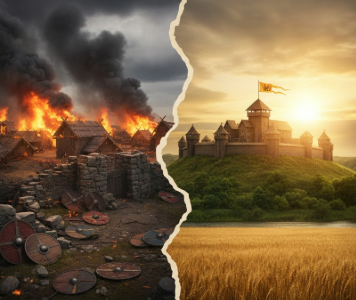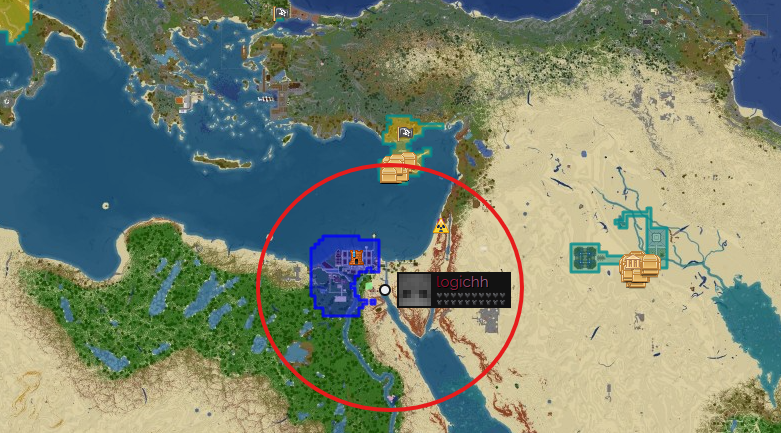Top
The Fall and Rebirth Of Wessex
In the aftermath of a grueling war and a stunning defeat, the landscape of Wessex has been irrevocably altered. The government that led its people into conflict has been dismantled, replaced overnight in what observers have called a coup. But is that the full story? Whispers of espionage, internal disorganization, and strategic planning paint a more complex picture. To unravel the truth behind the fall of old Wessex and the nature of its rebirth, we secured an exclusive interview with DeadlyPlumjellyy, a high-ranking member of the former administration, to get an insider's account of the final days.

By: rgc_bap
Published: October 16, 2025
Read Time: 3 min read
Before any war is fought, a kingdom is defined by its people and their contributions. One figure of note within the old administration was a user known as Rula. When we asked DeadlyPlumjellyy if Rula ever took undue credit for work, builds, or battles, his answer shed light on the internal dynamics of Wessex's leadership.
Question 1: Did Rula ever take credit for work/builds/pvp/battles?
DeadlyPlumjellyy: "Kind of a vague question; builds, no; grinding, he did a lot of grinding 'work'; openly admitted pvp was 'meh'; not much battles occurred."
The response suggests a clear division of labor within the kingdom. While Rula was not a frontline warrior or a master architect, his value was found in the relentless, unglamorous "work" of grinding—a crucial, if often overlooked, part of any war effort. The admission that "not much battles occurred" also hints that the war may have been lost before it truly began.
Chapter 2: A War Lost to Disorganisation
Every defeat has a cause. For Wessex, the reason was not a lack of will or strength, but a more fundamental flaw. When asked directly why Wessex lost the war, the answer was blunt and immediate.
Question 4: Why did Wessex lose the war?
DeadlyPlumjellyy: "Disorganisation."
This single word speaks volumes. It suggests a failure in command, communication, and strategy. Despite this, planning was not absent. DeadlyPlumjellyy confirmed his own deep involvement in the strategic side of the conflict, even if his real-life commitments kept him from the battlefield.
Question 5: Did you ever take part in any of the PVP or planning?
DeadlyPlumjellyy: "Lots of planning; always worked weekends so no time to fight in pvp."
Wessex, it seems, had strategists but perhaps lacked the cohesion to execute their plans effectively. The war was one of logistical and organizational failure, a battle lost not in the field, but in the planning rooms and communication channels.
Chapter 3: The Spy in Our Midst
While disorganisation was the internal enemy, an external threat was operating from within. The war with the rival faction, 'Americas', involved a clandestine layer of espionage. We questioned DeadlyPlumjellyy on a long-held rumour: was a player named Rambo a spy?
Question 6: Did Warhorde know Rambo was a spy for Americas?
DeadlyPlumjellyy: "Yes we fed him information we wanted him to know."
This stunning admission reveals a sophisticated counter-intelligence operation at the heart of the Wessex command. The leadership was not naive; they were actively engaged in a disinformation campaign, using the enemy's own asset against them. This adds a layer of tragic irony to their defeat—while they were capable of such intricate counter-espionage, they were ultimately undone by their own internal disarray.
Chapter 4: Not a Coup, but a "Peaceful Transition"
With the war lost, the final chapter of the old government was written. In a swift move, the existing leadership was overthrown. We presented this event to DeadlyPlumjellyy as a "coup," a term he immediately and firmly rejected, dismissing any notion of a violent or illegitimate seizure of power.
Question 2 & 3: Your statement on the Coup that overthrew the Wessex government last night? Do you plan to form a coup to get Wessex back?
DeadlyPlumjellyy: "No coup occurred you silly treeden journalist never in great town of wessex just peaceful transition of power."
His words reframe the entire event. Where outsiders saw a coup, he insists there was an orderly—if sudden—handover. He dismisses the idea of a counter-coup, indicating an acceptance of the new reality. According to this high-level source, the fall of Wessex's government was not a hostile takeover, but the final, logical consequence of its military failure—a "peaceful transition" into a new era. The rebirth of Wessex had begun.
Comments
No comments yet. Be the first to share your thoughts!


